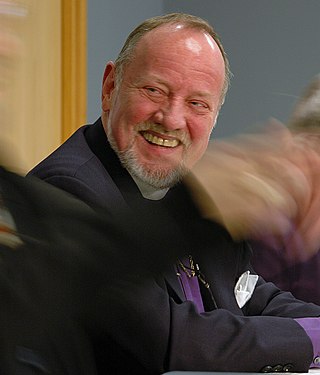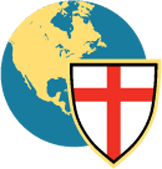A bishop is an ordained member of the clergy who is entrusted with a position of authority and oversight in a religious institution. In Christianity, bishops are normally responsible for the governance and administration of dioceses. The role or office of the bishop is called episcopacy. Organizationally, several Christian denominations utilize ecclesiastical structures that call for the position of bishops, while other denominations have dispensed with this office, seeing it as a symbol of power. Bishops have also exercised political authority within their dioceses.

The Evangelical Lutheran Church of Finland is a national church of Finland. It is part of the Lutheran branch of Christianity. The church has a legal position as a national church in the country, along with the Orthodox Church of Finland.
The Scottish Episcopal Church is the ecclesiastical province of the Anglican Communion in Scotland.
Since the 1990s, the Anglican Communion has struggled with controversy regarding homosexuality in the church. In 1998, the 13th Lambeth Conference of Anglican bishops passed a resolution "rejecting homosexual practice as incompatible with Scripture". However, this is not legally binding. "Like all Lambeth Conference resolutions, it is not legally binding on all provinces of the Communion, including the Church of England, though it commends an essential and persuasive view of the attitude of the Communion." "Anglican national churches in Brazil, South Africa, South India, New Zealand and Canada have taken steps toward approving and celebrating same-sex relationships amid strong resistance among other national churches within the 80 million-member global body. The Episcopal Church in the U.S. has allowed same-sex marriage since 2015, and the Scottish Episcopal Church has allowed same-sex marriage since 2017." In 2017, clergy within the Church of England indicated their inclination towards supporting same-sex marriage by dismissing a bishops' report that explicitly asserted the exclusivity of church weddings to unions between a man and a woman. At General Synod in 2019, the Church of England announced that same-gender couples may remain recognised as married after one spouse experiences a gender transition. In 2023, the Church of England announced that it would authorise "prayers of thanksgiving, dedication and for God's blessing for same-sex couples."
The Confessing Movement is a largely lay-led theologically conservative Christian movement that opposes the influence of theological liberalism and theological progressivism currently within several mainline Protestant denominations and seeks to return them to its view of orthodox doctrine, or form a new denomination and disfellowship (excommunicate) them if the situation becomes untenable. Those who eventually deem dealing with theological liberalism and theological progressivism within their churches and denominations as not being tenable anymore would later join or start Confessional Churches and/or Evangelical Churches that continue with the traditions of their respective denominations and maintaining orthodox doctrine while being ecclesiastically separate from the Mainline Protestant denominations.

The Evangelical Lutheran Church in Canada is Canada's largest Lutheran denomination, with 95,000 baptized members in 519 congregations, with the second largest, the Lutheran Church–Canada, having 53,165 baptized members. Together with the LCC and the Canadian Association of Lutheran Congregations, it is one of only three all-Canadian Lutheran denominations. It is a member of the Lutheran World Federation, the Canadian Council of Churches, the World Council of Churches, and the Anglican-Lutheran North American grouping Churches Beyond Borders. According to the 2011 Canadian census, a larger number of 478,185 adherents identify as Lutheran.

The Anglican Church of Canada is the province of the Anglican Communion in Canada. The official French-language name is l'Église anglicane du Canada. In 2017, the Anglican Church counted 359,030 members on parish rolls in 2,206 congregations, organized into 1,571 parishes. The 2021 Canadian census counted 1,134,315 self-identified Anglicans, making the Anglican Church the third-largest Canadian church after the Catholic Church and the United Church of Canada. The 2021 Canadian census counted more than 1 million self-identified Anglicans, remaining the third-largest Canadian church.
The blessing or wedding of same-sex marriages and same-sex unions is an issue about which leaders of Christian churches are in ongoing disagreement. Traditionally, Christianity teaches that homosexual acts are sinful and that holy matrimony can only exist between two persons of different sexes. These disagreements are primarily centred on the interpretation of various scripture passages related to homosexuality, sacred tradition, and in some churches on varying understandings of homosexuality in terms of psychology, genetics and other scientific data. While numerous church bodies have widely varying practices and teachings, individual Christians of every major tradition are involved in practical (orthopraxy) discussions about how to respond to the issue.
A presiding bishop is an ecclesiastical position in some denominations of Christianity.
A prolocutor is a chairman of some ecclesiastical assemblies in Anglicanism.
The Anglican Church in Aotearoa, New Zealand and Polynesia, formerly the Church of the Province of New Zealand, is a province of the Anglican Communion serving New Zealand, Fiji, Tonga, Samoa, and the Cook Islands. Since 1992 the church has consisted of three tikanga or cultural streams: Aotearoa, New Zealand, and Polynesia. The church's constitution says that, among other things, it is required to "maintain the right of every person to choose any particular cultural expression of the faith". As a result, the church's General Synod has agreed upon the development of the three-person primacy based on this three tikanga system. It has three primates (leaders), each representing a tikanga, who share authority.

Peter Elliott is a Canadian priest. He is the former (retired) rector of Christ Church Cathedral and Dean of New Westminster in the Anglican Church of Canada. Elliott grew up in St. Catharines, Ontario. In 1976 he received a Bachelor of Arts degree in English literature and philosophy from Trent University in Peterborough, Ontario. Subsequently, he attended and graduated from the Episcopal Divinity School in Cambridge, Massachusetts. In 1981 he was ordained a priest in the Diocese of Niagara. Prior to coming to Vancouver he was Director of Ministries in Church and Society with the Anglican Church of Canada. In 1994, Elliott was made rector of Christ Church Cathedral and Dean of New Westminster. He retired in October 2019 after 25 years.

Andrew Sandford Hutchison is a Canadian retired Anglican bishop who served as Primate of the Anglican Church of Canada from 2004 to 2007. Prior to his election at the General Synod of 2004, he was the Bishop of Montreal and Metropolitan of the ecclesiastical province of Canada. He was viewed as one of the more liberal contenders in the primatial election, and was Canadian Chair of Affirming Catholicism. He was elected amid controversy over his support for blessing same-sex unions.

Frederick James Hiltz is a Canadian retired Anglican bishop. From 2007 to 2019, he served as Primate of the Anglican Church of Canada.

The Anglican Church in North America (ACNA) is a Christian denomination in the Anglican tradition in the United States and Canada. It also includes ten congregations in Mexico, two mission churches in Guatemala, and a missionary diocese in Cuba. Headquartered in Ambridge, Pennsylvania, the church reported 977 congregations and 124,999 members in 2022. The first archbishop of the ACNA was Robert Duncan, who was succeeded by Foley Beach in 2014.
The Archbishops' Council is a part of the governance structures of the Church of England. Its headquarters are at Church House, Great Smith Street, London.
The ordination of lesbian, gay, bisexual and/or transgender (LGBT) clergy who are open about their sexuality or gender identity; are sexually active if lesbian, gay, or bisexual; or are in committed same-sex relationships is a debated practice within some contemporary Christian denominations.
The Anglican Church of Canada is the third largest church in Canada, after the Roman Catholic Church and the United Church of Canada. After many years of debate, the first blessing of a same-sex partnership took place in 2003, by the Diocese of New Westminster, in Vancouver. This was not considered a marriage ceremony, but rather a blessing of "permanent and faithful commitments" between persons of the same sex.








